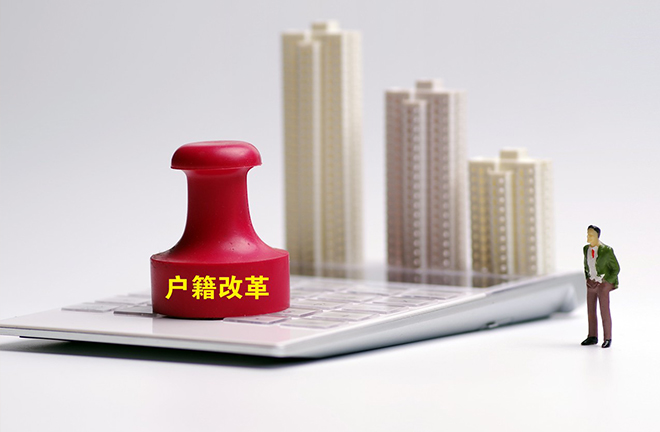Deepened hukou reform to empower urban-rural integration

Regarded critical to the urbanization of rural migrants, the primary task of China’s new urbanization drive, reform to the hukou system holds the key to integrated urban-rural development. Photo: TUCHONG
The Resolution of the CPC Central Committee on Further Deepening Reform Comprehensively to Advance Chinese Modernization (hereinafter referred to as “the Resolution”) emphasizes that integrated urban and rural development is essential to Chinese modernization, urging efforts to improve the institutions and mechanisms for advancing new urbanization.
According to the Resolution, the systems for allowing people to obtain household registration and access basic public services in their place of permanent residence will be implemented, and the lawful land rights and interests of former rural residents who now hold permanent urban residency will be protected.
Reforming the household registration, or hukou, system is a pivotal measure for advancing social equity and justice, with far-reaching implications for integrated urban-rural development.
Key link of urban-rural integration
Integrated urban-rural development centers on harmonizing resources, public services, and regional development between urban and rural areas. For decades, the two-track urban-rural hukou system has acted as an invisible barrier, restricting the free flow of key production factors like labor, capital, and technology between cities and the countryside. To this end, the hukou reform aims to relax requirements for granting urban residency, remove unreasonable restrictions, break down urban-rural barriers, and enable labor to move freely based on market demand, while optimizing capital and technology allocation across urban and rural areas.
The integration of urban and rural public services involves ensuring equal access to public services like social security and infrastructure. Under the two-track hukou system, rural residents have faced significant disadvantages in access to education, medical care, and elderly care compared to their urban counterparts. Reforming the hukou system thus entails eliminating the role of the original registered status in allocating public resources.
The integration of urban and rural regions requires cities and the countryside to leverage their distinct characteristics and advantages in a complementary and interactive fashion, gradually reducing disparities in their development stages. As urban-rural integration progresses, rural infrastructure and public service levels will continually improve alongside living conditions.
Essence of reform
While the hukou system may appear to be simply a form of household registration, it actually serves as a mechanism for distributing public resources. Since reform and opening up, the accelerated flow of people, capital, and resources has transformed China into a highly mobile society. Yet, the public resource allocation system, which is based on household registration, inherently restricts mobility and fails to meet the needs of a mobile society, leading to a misalignment of public resources between urban and rural areas.
Since the 18th CPC National Congress, China has prioritized reforms to adapt the hukou system to this increasingly mobile society, aiming to decouple public resource allocation from hukou status and urging local governments in areas with large inflows of migrants to assume their responsibilities. However, obstacles persist in larger cities, particularly in megacities, where migrant populations still struggle to enjoy equal rights with local residents in areas such as housing and education.
Therefore, the Resolution underscored the need to implement the systems for allowing people to obtain household registration and access basic public services in their place of permanent residence. This approach will further detach hukou status from resource allocation, eliminating its outdated function in distributing resources and ensuring that public resources are allocated based on actual residences.
Bidirectional empowerment
The hukou reform must advance by empowering both urban and rural areas to enable integrated development. At the Central Rural Work Conference, held in December 2020, General Secretary of the CPC Central Committee Xi Jinping emphasized that building a modern socialist nation in all respects is a long-term process. He noted that before rural residents thoroughly establish themselves in urban areas, it is essential that their ties to the countryside are not entirely severed, allowing them the flexibility to move freely between urban and rural settings. This distinctive feature of Chinese urbanization provides strategic flexibility and resilience in the face of challenges.
To enable free flow between urban and rural areas, it is essential to address the concerns of former rural residents who now hold permanent urban residency and empower them in both urban and rural settings.
In cities, this empowerment focuses on granting non-local residents the same access to basic public services as local residents. Currently, some megacities continue to use a points-based system for residency and school admissions, which allocates varying levels of access to public services based on criteria such as individual qualifications and contributions to the city. This tiered approach has still led to inequities, particularly in access to high school education and the college entrance exam for children of migrant families, reflecting lingering issues of fairness.
In the countryside, the rights and interests of former rural residents who now hold permanent urban residency should be protected. As the Resolution points out, “we will protect, in accordance with the law, their rights to contract rural land, to use their rural residential land, and to share in the proceeds from rural collective undertakings, and explore avenues to facilitate voluntary, paid transfers of these rights.”
Rural land is where the roots of rural residents lie, carrying both property and social security attributes. After rural migrants obtain urban residency, it is critical to ensure that they retain their land rights and interests in rural areas and their right to share in the proceeds from rural collective undertakings.
Deng Zhiping (director and research fellow) and Zhang Guijin (associate research fellow) are from the Institute of Sociology and Population Studies at the Guangdong Academy of Social Sciences.
Edited by CHEN MIRONG
